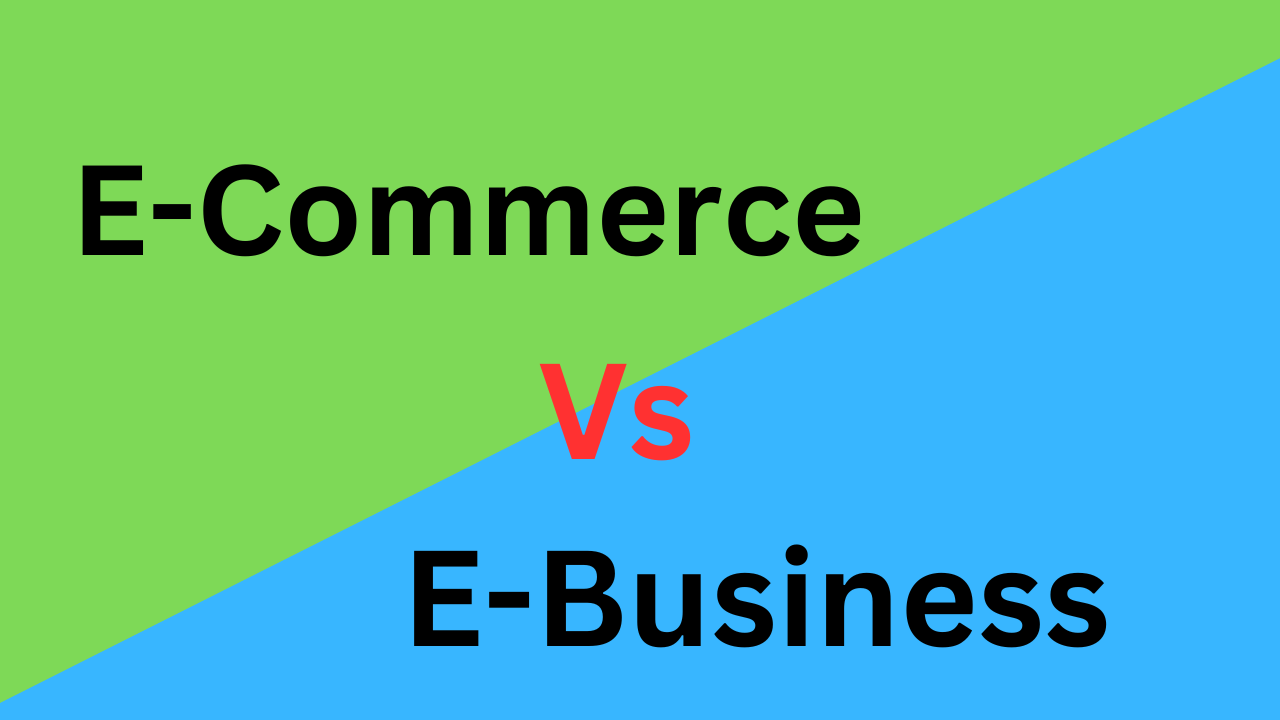What is the main difference between e-commerce and e-business? E-commerce refers to transactions being conducted over the internet (performing online commercial activities), while e-business refers to performing all types of business activities over the internet.
Many people tend to use e-commerce and e-business interchangeably. But these terms are different despite having some close similarities. Both e-commerce and e-business involves undertaking business over the internet.
We wrote this comparison article to help you differentiate between e-business and e-commerce without experiencing confusion. You will also get to know e-commerce and e-business examples with their advantages and disadvantages.
Difference Between E-Commerce and E-Business With Table
| Basic Terms | E-Commerce | E-Business |
| Meaning | It refers to performing online commercial transactions and activities over the internet. | It refers to performing all types of business activities over the internet. |
| Scope | Narrower concept and a sub-set of e-business. | A broader concept and super-set of e-commerce. |
| Transactions | Commercial transactions | Business transactions |
| Limitation | Limited transactions | Unlimited transactions |
| Activities | Buying and selling products in monetary terms | Customer education, raw materials procurement, and supply activities to make money. |
| Operation | Rely on websites only. | Rely on multiple websites, ERP’s and CRM that connect different business processes. |
| Resources | Mandatory use of internet. | Use of internet, intranet, and extranet. |
| Business Models | Business to customers (B2C) | Business to business (B2B) |
| Coverage | External business processes | Both internal and external business processes. |
| Approach | Extroverted | Ambiverted |
What Is E-Commerce?
E-commerce is an abbreviation of electronic commerce. It is a revolutionary digital framework that enables buying and selling of goods and services through online platforms.
It has transformed the global marketplace by eliminating geographical barriers and allowing consumers or businesses to interact seamlessly in the virtual realm.
Advantages of E-Commerce
- Provides unparalleled convenience as customers can shop from the comfort of their homes.
- Businesses can expand their customer base beyond geographical boundaries.
- Customers can make purchases at any time.
- Have low operational costs.
Disadvantages of E-Commerce
- Customers can’t physically touch or try products before purchasing
- Consumers are susceptible to cyber-attacks, fraud, and data breaches.
- Lack of customer interaction with the sellers.
- Tedious process of return and refund.
What Is E-Business?
E-business is an abbreviation for electronic business.It refers to the comprehensive integration of digital technologies into various aspects of business operations.
E-business leverages the power of the internet and electronic platforms to conduct activities such as sales, marketing, customer service, procurement, and more.
It encompasses not only online transactions but also the entire ecosystem of digital interactions, including supply chain management, electronic communication, and data-driven decision-making.
E-business revolutionizes how organizations operate by optimizing processes, enhancing customer experiences, and enabling real-time collaborations across the global landscape.
Advantages of E-Business
- Business transcends geographical limitations
- Reduces overhead costs associated with physical stores.
- Customers can access products and services at any time.
- Generates valuable data about customer behavior and preference.
- Online platforms can accommodate increased demand without the constraints.
Disadvantages of E-Business
- Customers vulnerable to cyber-attacks and data breaches.
- Lack of personal interaction leading to reduce trust.
- Technical issue can interrupt operation.
Main Difference Between E-Commerce and E-Business
- E-commerce refers to carrying out commercial transactions online while E-business refers to carrying out all kinds of business activities and services over the internet.
- E-commerce involves buying and selling products to make money while E-business involves online presence of the business.
- E-commerce is a sub-set of E-Business, while E-business is a super-set of E-Commerce.
- E-commerce has limited transactions while e-business transactions are not limited.
- E-commerce require mandatory use of internet, while E-business require Internet, Intranet or Extranet.
Similarities Between E-Commerce and E-Business
- Both operate in the digital realm.
- Both involve online transactions.
- Both have the potential to reach a global audience.
- Both rely on data analytics and insights to make informed decisions.
- Both enable businesses to interact with customers digitally.
Final Thoughts from Expert
The distinctions between e-commerce and e-business are based on the diverse dimensions of online business operations. E-commerce focus on online buying and selling while e-business transcends mere transactions encompassing a broader spectrum of digital interaction.
From supply chain management to customer relationship management, e-business orchestrates the integration of digital technologies into all facets of business operations. While e-commerce excels in streamlining transactions and enhancing customer experiences.
E-business delves deeper by optimizing internal processes and extending its impact beyond sales. Acknowledging the differences between these concepts is crucial for businesses to harness the full potential of both e-commerce and e-business strategies.
People Who Read This Also Read:
- Difference between Bookkeeping and Accounting
- Difference between Accounting and Accountancy.
- Difference between Sales and Agreement to Sell.
- Difference between Wants and Needs
